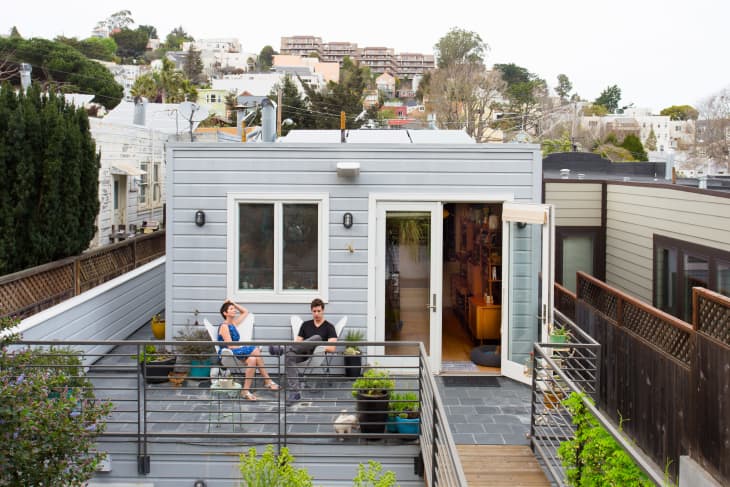Here’s the Salary You Need to Buy a Modest Home in New York City, San Francisco & 22 Other Places

It’s funny how buying a home became known as “The American Dream,” because for decades, it wasn’t a dream at all. Just a few generations ago (basically: your grandparents), buying a house in your 20’s was just reality.
I love this story from Relative Realty about a couple of real first-time buyers in Toronto—Ron and Joan, both “in their early 20’s”—achieving The American Canadian Dream. They bought a two-story semi-detached home in 1958 for $16,900 (CAD), and it sounds like a fairy tale:
Their down payment was $1500, $500 saved and $1,000 from inheritance. Ron brought home $3,500 a year as a police cadet and, at $75/month for the mortgage and a few lump sum payments, they paid off their home in 15 years.
Once upon a time, you could buy a nice home in a nice neighborhood on a salary of $3,500. And it would only take you 15 years to pay off your mortgage. And then everyone lived happily ever after in a castle they owned outright and retired at 65.
The end.
Could Ron and Joan Buy Their House Today?
According to Relative Realty, Ron and Joan’s house is worth more than $400,000 today, 23.7 times their 1958 purchase price. Yet Ron’s $3,500 police salary would be equal to bringing home $29,877 per year in modern dollars—only 8.5 times his 1958 salary—according to the inflation calculator from Bank of Canada. All else being equal, Ron and Joan never could have bought that house today.
So how much would it take? Using a financing calculator from a Canadian realtor, Premiere Mortgage Center, in order to buy that same $400,000 house today with 10 percent down (Ron and Joan’s 1958 down payment was around 8 percent) and pay it off in 15 years, you’d need to make around $112,000 annually. And if you’re willing to sign up for a 30-year loan instead, you’ll still need to be making around $77,000 per year—still more than double Ron’s adjusted salary.
The moral of the story is this: It’s a lot harder, financially, to own a home today than it was for our grandparents, and it requires a much larger salary.
What Salary Do You Need to Buy a Home Today?
There are a lot of variables that come into play when it comes to figuring out how much house you can afford, and the only way to know for sure is to talk to a lender (or three—shop around) to review your actual salary, cash, credit and rates. But we crunched some numbers in order to give a general snapshot of the earning power required to become a homebuyer in 24 different U.S. metro areas.
Using the median home price in each city (from the National Association of Realtors), a 20 percent down payment, and the current 30-year fixed-rate interest rate, and Bankrate’s mortgage calculator, we were able to determine the total salary required to afford the base cost of owning a home—the principal, interest, taxes and insurance—in each area.
Here’s how it shakes out nationally:
National
Median home price: $248,800
Monthly payment: $1,599
Salary needed: $68,501
East Coast:
Boston:
Boston
Median home price: $452,900
Monthly payment: $2,683
Salary needed: $114,940
New York City:
New York City
Median home price: $404,300
Monthly payment: $2,425
Salary needed: $103,887
Philadelphia:
Philadelphia
Median home price: $230,000
Monthly payment: $1,499
Salary needed: $64,217
Baltimore
Baltimore
Median home price: $262,900
Monthly payment: $1,673
Salary needed: $71,671
Washington, D.C.:
Washington, D.C.
Median home price: $406,700
Monthly payment: $2,437
Salary needed: $104,401
South:
Atlanta:
Atlanta
Median home price: $198,500
Monthly payment: $1,332
Salary needed: $57,063
Orlando:
Orlando
Median home price: $244,900
Monthly payment: $1,578
Salary needed: $67,602
Tampa:
Tampa
Median home price: $220,000
Monthly payment: $1,422
Salary needed: $60,918
Miami:
Miami
Median home price: $330,000
Monthly payment: $2,030
Salary needed: $86,965
Dallas:
Dallas
Median home price: $247,400
Monthly payment: $1,591
Salary needed: $68,158
Houston:
Houston
Median home price: $231,100
Monthly payment: $1,505
Salary needed: $64,474
San Antonio:
San Antonio
Median home price: $217,200
Monthly payment: $1,431
Salary needed: $61,304
Denver:
Denver
Median home price: $414,700
Monthly payment: $2,480
Salary needed: $106,243
Phoenix:
Phoenix
Median home price: $246,700
Monthly payment: $1,587
Salary needed: $67,987
West Coast:
San Diego:
San Diego
Median home price: $599,900
Monthly payment: $3,463
Salary needed: $148,355
Los Angeles:
Los Angeles
Median home price: $550,800
Monthly payment: $3,202
Salary needed: $137,174
San Francisco:
San Francisco
Median home price: $900,000
Monthly payment: $5,057
Salary needed: $216,642
Sacramento:
Sacramento
Median home price: $340,000
Monthly payment: $2,084
Salary needed: $89,279
Portland:
Portland
Median home price: $381,800
Monthly payment: $2,305
Salary needed: $98,746
Seattle:
Seattle
Median home price: $465,800
Monthly payment: $2,751
Salary needed: $117,853
Midwest:
Minneapolis:
Minneapolis
Median home price: $252,100
Monthly payment: $1,617
Salary needed: $69,272
Chicago:
Chicago
Median home price: $248,500
Monthly payment: $1,597
Salary needed: $68,415
St. Louis:
St Louis
Median home price: $169,400
Monthly payment: $1,177
Salary needed: $50,422
Cincinnati:
Cincinnati
Median home price: $162,000
Monthly payment: $1,138
Salary needed: $48,752
Cleveland:
Cleveland
Median home price: $140,400
Monthly payment: $1,023
Salary needed: $43,825
If you’re thinking about buying a home someday soon, these numbers should offer a small gut check to see how close you are to making The American Dream a reality. And, it’s important to note, we subtracted a 20-percent down payment from the NAR median home prices, so if you’re thinking about putting down less (like the 3.5% required for an FHA loan), you’ll need to earn even more to afford your monthly payments.
What do you think about the findings? Less than you thought? More? Encouraging? Disheartening? Share your thoughts in the comments below.
Re-edited from a post originally published 9.7.2016 – LS